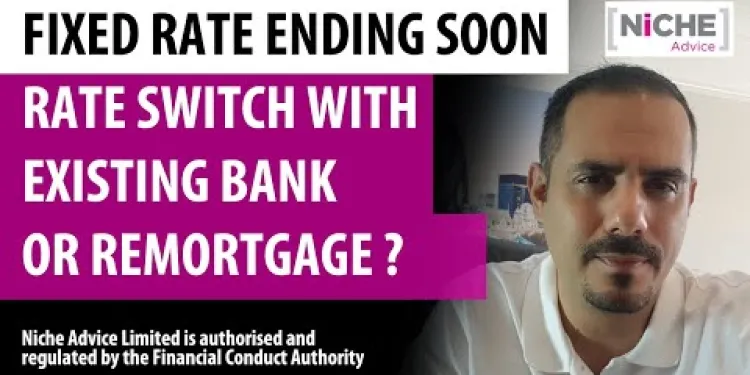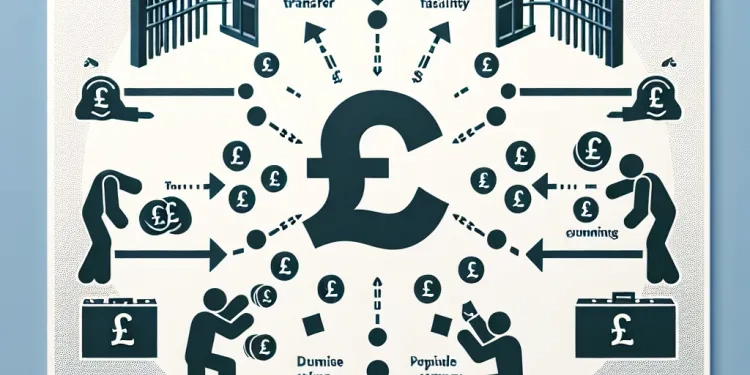Find Help
More Items From Ergsy search
-

Product Transfer Rate Switch vs Remortgage What's Best
Relevance: 100%
-

Remortgage within 6 Months on the open market value Residential or Buy to Let Properties
Relevance: 43%
-

What is an SVR and how does it relate to interest rate changes?
Relevance: 36%
-

Can I transfer a balance to a card with no promotional offer?
Relevance: 33%
-

How do I apply for a balance transfer card?
Relevance: 32%
-

What is a balance transfer credit limit?
Relevance: 32%
-

Are there any fees associated with balance transfers?
Relevance: 32%
-

Is a balance transfer the right choice for me?
Relevance: 31%
-

Do balance transfer offers apply to new purchases?
Relevance: 31%
-

How does a balance transfer work?
Relevance: 31%
-

What is a Balance Transfer Credit Card?
Relevance: 30%
-

What is the typical duration of a promotional balance transfer offer?
Relevance: 30%
-

Will transferring a balance affect my credit score?
Relevance: 30%
-

Can I use a balance transfer card for new purchases?
Relevance: 30%
-

Can I transfer my ISA between providers?
Relevance: 30%
-

What are the benefits of a balance transfer credit card?
Relevance: 29%
-

Is there a minimum transfer amount required?
Relevance: 29%
-

Major Banks Announce Changes in Interest Rates: Are You Affected?
Relevance: 29%
-

Can I transfer a balance from a loan to a credit card?
Relevance: 29%
-

What is a good credit score to qualify for a balance transfer card?
Relevance: 28%
-

How long does a balance transfer take?
Relevance: 28%
-

How are embryos transferred during IVF?
Relevance: 28%
-

Can I transfer balances from any credit card?
Relevance: 27%
-

What happens to my monthly payments if interest rates rise?
Relevance: 26%
-

Can I transfer cashback rewards to another credit card?
Relevance: 26%
-

How many embryos are usually transferred in IVF?
Relevance: 26%
-

Will my fixed-rate mortgage payments change with interest rate fluctuations?
Relevance: 25%
-

Can a company refuse to register a share transfer?
Relevance: 25%
-

Is it possible to switch my mortgage type if interest rates become unfavourable?
Relevance: 25%
-

What happens if an inmate is transferred to another facility?
Relevance: 25%
-

How are product recalls managed in the UK?
Relevance: 25%
-

Can I transfer my TV license to a new address?
Relevance: 25%
-

What is a Product Recall in the UK?
Relevance: 24%
-

How can I protect myself from rising interest rates?
Relevance: 23%
-

Can recalled products be resold?
Relevance: 23%
-

Can product recalls be reversed?
Relevance: 23%
-

Are all car finance products potentially subject to mis-selling?
Relevance: 23%
-

Can a product recall be voluntary?
Relevance: 23%
-

How do interest rate changes affect my mortgage payments?
Relevance: 22%
-

Who can initiate a product recall in the UK?
Relevance: 22%
Product Transfer Rate Switch vs Remortgage: What's Best?
Understanding Product Transfer Rate Switch
A product transfer rate switch involves changing to a new mortgage rate with your existing lender without moving to a different provider. This allows homeowners to pivot on their mortgage terms and interest rates without the added complications of switching lenders. In the UK, many banks and building societies offer attractive product transfer options as a simpler, less costly alternative to remortgaging.
With a product transfer, there is typically no need to undergo a credit check or extensive valuation process, making it an appealing option for those who wish to avoid paperwork and fees associated with setting up a new account entirely. Customers can usually switch to a new rate within a few weeks, given all parameters align conveniently.
Exploring Remortgaging
Remortgaging involves switching your mortgage to a new lender, often to secure more favorable interest rates or to release equity. While this can potentially yield better financial benefits in the long run, it comes with more administrative effort and potentially higher costs. These costs may include valuation fees, legal fees, and sometimes early redemption charges with your current lender. That said, if you're planning significant home improvements or need to consolidate debt, remortgaging might provide greater flexibility.
In the competitive UK mortgage market, remortgaging can sometimes unlock significantly lower interest rates, although it's crucial to compare the overall savings against any added fees involved in the transition.
Comparing the Benefits and Drawbacks
The decision between a product transfer rate switch and remortgaging depends largely on your financial situation and future plans. A product transfer can save time and money by avoiding additional fees and complex paperwork, which is advantageous for those seeking straightforward rate adjustments. However, if the primary aim is financial optimisation through lower interest rates or accessing equity, a remortgage could be more beneficial.
Your decision should factor in any early repayment fees from your existing mortgage and whether the potential savings from a lower rate outweigh these costs. Consulting with a financial advisor can also assist in weighing these options carefully.
Product Transfer Rate Switch vs Remortgage: What's Best?
What is a Product Transfer Rate Switch?
A product transfer rate switch is when you change to a new mortgage rate with the same bank. This means you don't have to switch to a new bank or lender. Many people in the UK do this because it is easier and cheaper than getting a new mortgage with a different bank.
When you do a product transfer, you usually don't need a credit check or a house valuation. This makes it quicker and with less paperwork. You can often switch to a new rate in a few weeks if everything goes smoothly.
What is Remortgaging?
Remortgaging is when you take your mortgage to a new bank. People do this to get a better interest rate or to borrow more money. Remortgaging can help save money in the long run, but it can be more complicated and expensive. You might have to pay for a valuation, legal fees, and possible charges from your current lender.
Remortgaging can be a good option if you want to improve your home or manage debt. It can sometimes give you much lower interest rates, but you need to make sure that the savings are more than the costs involved.
Should You Choose a Product Transfer or Remortgage?
Choosing between a product transfer and remortgaging depends on your money situation and plans. A product transfer is easier, quicker, and usually cheaper because there are fewer fees and no complicated forms. This is good if you just want to change your rate easily.
If you want to save money with lower rates or borrow more, remortgaging might be better. But you need to think about any costs for paying off your current mortgage early and whether the new savings are worth these costs.
Talking to a financial advisor can help you understand these options better and make the right choice for you.
Frequently Asked Questions
What is a Product Transfer Rate Switch?
A Product Transfer Rate Switch is when you switch to a new mortgage deal with your current lender without changing the amount you owe or the term of the loan.
What does it mean to remortgage?
Remortgaging refers to the process of switching your mortgage from one lender to another to secure a better deal or borrow more money against your property's value.
How do I decide between a Product Transfer and a Remortgage?
You should consider a Product Transfer if you prefer to stay with your current lender and your current lender offers competitive rates. Remortgaging might be more beneficial if other lenders offer better rates or if you want more borrowing flexibility.
Are there any fees involved in a Product Transfer?
Typically, a Product Transfer involves lower fees than remortgaging, as you are staying with your current lender, but always check for potential product fees.
What fees can I expect when remortgaging?
Fees for remortgaging may include valuation fees, legal fees, and early repayment charges from your current lender. Some lenders may offer incentives to cover these costs.
Can I borrow more money with a Product Transfer?
A Product Transfer generally only allows you to switch the interest rate on your existing balance. If you want to borrow more money, you would typically need to remortgage.
Do I need to go through a credit check for a Product Transfer?
Usually, a Product Transfer with your existing lender doesn't require a full credit check since you are not changing lenders.
Will remortgaging affect my credit score?
Remortgaging can affect your credit score as it involves a full credit assessment by the new lender.
How long does a Product Transfer take?
A Product Transfer can often be completed within a few weeks as it involves less paperwork and no new legal checks.
How long does it take to remortgage?
Remortgaging can take between four to eight weeks, depending on the complexity and responsiveness of your new lender.
Is a Product Transfer easier than remortgaging?
Yes, a Product Transfer is generally simpler and quicker because there are fewer checks and you stay with the same lender.
Will I still have to undergo affordability checks with a Product Transfer?
Some lenders may require affordability checks for a Product Transfer, especially if your financial situation has changed.
Can I remortgage if my property value has dropped?
It can be more challenging to remortgage if your property value has decreased, but not impossible. Some lenders have specific deals for these situations.
Can I switch to a fixed rate with a Product Transfer?
Yes, during a Product Transfer, you're typically able to choose a new rate option, such as a fixed rate, offered by your current lender.
Is there a chance of getting a better deal through remortgaging?
Yes, remortgaging can often lead to better deals if other lenders are offering more competitive interest rates or if you wish to consolidate other debts into your mortgage.
What is a Product Transfer Rate Switch?
A product transfer rate switch is when you change the interest rate on your loan without moving to a new lender.
Here is how it works:
- You stay with the same loan company.
- You change how much interest you pay.
To help with this, you can:
- Ask questions to your bank or loan advisor.
- Use online tools to compare rates.
A Product Transfer Rate Switch means changing to a new mortgage deal with the same bank or lender. You keep the same loan amount and the same time to pay it back.
What does it mean to remortgage?
Remortgaging means getting a new loan on your home. This can help you pay less money each month or get more money for other things.
Here are some ways to help you understand:
- Think about talking to someone who knows about loans, like a money expert.
- Use simple tools, like number charts, to see how much you can save.
- Ask questions if you are not sure. It's okay to ask for help.
- Take your time to learn. You don’t have to rush.
Remortgaging means changing the company that gives you money for your house. People do this to get a better money deal or to borrow more money using their house.
How do I choose between a Product Transfer and a Remortgage?
Here is how you can choose:
- Product Transfer: This is when you stay with your current bank but change your mortgage deal. It is quick and usually has low fees.
- Remortgage: This is when you change your mortgage to a new lender, or change your deal with the same bank. You might find better terms but it can take longer and might cost more.
Think about the following to help you decide:
- How much time and effort can you spend shopping around?
- Are you happy with your current bank?
- Will switching save you money in the long run?
Tips:
- Use a calculator tool online to see which option saves you more money.
- Talk to a mortgage advisor for help.
Think about a Product Transfer if you want to keep your current lender and they have good rates. Remortgaging might be better if other lenders have lower rates or if you need more borrowing choices.
Do I have to pay money to change my product?
A Product Transfer usually costs less money than getting a new mortgage with a different bank. This is because you are staying with the same bank you already have. But, remember to check if there are any extra fees you need to pay.
What fees will I pay when I get a new mortgage?
When you remortgage, you might have to pay some extra costs. These can be:
- Check fees: This is to see how much your home is worth.
- Lawyer fees: You pay a lawyer to help with the paperwork.
- Early leave fees: If you end your old mortgage early, you might have to pay a fee.
Some banks or lenders might help you by paying these costs for you.
If you need help reading, you can use tools that read out loud or ask someone to read with you.
Can I get more money when I change my loan product?
If you want to change your loan product, you might be able to borrow more money. This is called a Product Transfer.
Here are some things to do:
- Ask your bank or lender if you can borrow more money.
- See if there are any extra rules you must follow.
- Use a calculator to see how much you can borrow.
Helpful tools:
- Ask someone you trust to explain things.
- Use pictures or drawings to help you understand.
- Take your time and ask questions if you're unsure.
A Product Transfer lets you change the interest rate on the money you already owe. If you need more money, you usually have to remortgage.
Will they check my credit for a Product Transfer?
If you want to change your loan or deal, they might check your money history.
Here are some tips to help you:
- Ask someone to help you understand what a credit check is.
- Use simple words to explain your money history.
- Make a list of your questions before talking to someone about your loan.
When you stay with your current lender and switch to a new product, it is called a Product Transfer. You usually don't need a full credit check for this because you are not moving to a different lender.
Will changing my mortgage affect my credit score?
Changing your mortgage to a new lender might change your credit score. This is because the new lender checks your credit before giving you a mortgage.
How long does it take to move a product?
It usually takes a short time to move a product. Here are some tips to help:
- Use a calendar to track dates.
- Ask someone for help if you are unsure.
- Set reminders on your phone or a watch.
If you have questions, ask a friend or family member to explain.
A Product Transfer can be done in a few weeks. It is quick because there is not much paperwork and no new legal checks are needed.
How long does it take to get a new mortgage?
Getting a new mortgage can take some time. Here is what to expect and some tips to help:
- Time: It usually takes about 4 to 8 weeks.
- Steps: You will have to fill out forms, and the bank will check your money and credit.
- Tools: You can use a calendar to keep track of important dates.
- Help: Ask an adult or a friend for help if you are not sure what to do.
Remember, you might have to wait but you can ask for help if you need it.
Changing your mortgage can take about 4 to 8 weeks. How long it takes depends on how complicated it is and how quickly your new lender works.
Is it easier to change your loan with the same bank or get a new loan?
Yes, a Product Transfer is usually easier and faster. This is because there are fewer things to check, and you stay with the same bank.
Will I still need to do money checks with a Product Transfer?
When you switch your mortgage deal, sometimes the bank checks if you can pay. This is called an "affordability check." It helps the bank see if you have enough money.
Tools like a calculator or getting help from someone who understands money can be useful. They can make these checks easier for you.
Some banks or loan companies might want to check if you can still pay for your new plan, especially if your money situation has changed.
Can I get a new mortgage if my house is worth less now?
It's not as easy to get a new mortgage if your house is worth less than it was before. But you can still do it! Some banks have special plans to help with this.
Can I change to a fixed rate with a Product Transfer?
Do you want to change how much you pay on your loan? A Product Transfer can help!
With a Product Transfer, you can ask your bank to change your rate.
You can choose a fixed rate. This means you pay the same amount every month. It makes it easier to plan your money.
Ask someone you trust if you need help, like a family member or a friend.
Using a calculator can also help you see how your payments might change.
Yes, when you do a Product Transfer, you can usually pick a new rate, like a fixed rate, from your current lender.
Can I get a better deal by changing my mortgage?
Changing your mortgage could save you money. Talk to a mortgage advisor. They can help you find the best deal. Use a calculator to see if remortgaging is good for you.
Yes, you can often get a better deal by changing your mortgage. This can happen if other companies have lower interest rates or if you want to include other debts in your mortgage.
Useful Links
This website offers general information and is not a substitute for professional advice.
Always seek guidance from qualified professionals.
If you have any medical concerns or need urgent help, contact a healthcare professional or emergency services immediately.
- Ergsy carfully checks the information in the videos we provide here.
- Videos shown by Youtube after a video has completed, have NOT been reviewed by ERGSY.
- To view, click the arrow in centre of video.
- Most of the videos you find here will have subtitles and/or closed captions available.
- You may need to turn these on, and choose your preferred language.
- Go to the video you'd like to watch.
- If closed captions (CC) are available, settings will be visible on the bottom right of the video player.
- To turn on Captions, click settings .
- To turn off Captions, click settings again.
More Items From Ergsy search
-

Product Transfer Rate Switch vs Remortgage What's Best
Relevance: 100%
-

Remortgage within 6 Months on the open market value Residential or Buy to Let Properties
Relevance: 43%
-

What is an SVR and how does it relate to interest rate changes?
Relevance: 36%
-

Can I transfer a balance to a card with no promotional offer?
Relevance: 33%
-

How do I apply for a balance transfer card?
Relevance: 32%
-

What is a balance transfer credit limit?
Relevance: 32%
-

Are there any fees associated with balance transfers?
Relevance: 32%
-

Is a balance transfer the right choice for me?
Relevance: 31%
-

Do balance transfer offers apply to new purchases?
Relevance: 31%
-

How does a balance transfer work?
Relevance: 31%
-

What is a Balance Transfer Credit Card?
Relevance: 30%
-

What is the typical duration of a promotional balance transfer offer?
Relevance: 30%
-

Will transferring a balance affect my credit score?
Relevance: 30%
-

Can I use a balance transfer card for new purchases?
Relevance: 30%
-

Can I transfer my ISA between providers?
Relevance: 30%
-

What are the benefits of a balance transfer credit card?
Relevance: 29%
-

Is there a minimum transfer amount required?
Relevance: 29%
-

Major Banks Announce Changes in Interest Rates: Are You Affected?
Relevance: 29%
-

Can I transfer a balance from a loan to a credit card?
Relevance: 29%
-

What is a good credit score to qualify for a balance transfer card?
Relevance: 28%
-

How long does a balance transfer take?
Relevance: 28%
-

How are embryos transferred during IVF?
Relevance: 28%
-

Can I transfer balances from any credit card?
Relevance: 27%
-

What happens to my monthly payments if interest rates rise?
Relevance: 26%
-

Can I transfer cashback rewards to another credit card?
Relevance: 26%
-

How many embryos are usually transferred in IVF?
Relevance: 26%
-

Will my fixed-rate mortgage payments change with interest rate fluctuations?
Relevance: 25%
-

Can a company refuse to register a share transfer?
Relevance: 25%
-

Is it possible to switch my mortgage type if interest rates become unfavourable?
Relevance: 25%
-

What happens if an inmate is transferred to another facility?
Relevance: 25%
-

How are product recalls managed in the UK?
Relevance: 25%
-

Can I transfer my TV license to a new address?
Relevance: 25%
-

What is a Product Recall in the UK?
Relevance: 24%
-

How can I protect myself from rising interest rates?
Relevance: 23%
-

Can recalled products be resold?
Relevance: 23%
-

Can product recalls be reversed?
Relevance: 23%
-

Are all car finance products potentially subject to mis-selling?
Relevance: 23%
-

Can a product recall be voluntary?
Relevance: 23%
-

How do interest rate changes affect my mortgage payments?
Relevance: 22%
-

Who can initiate a product recall in the UK?
Relevance: 22%


